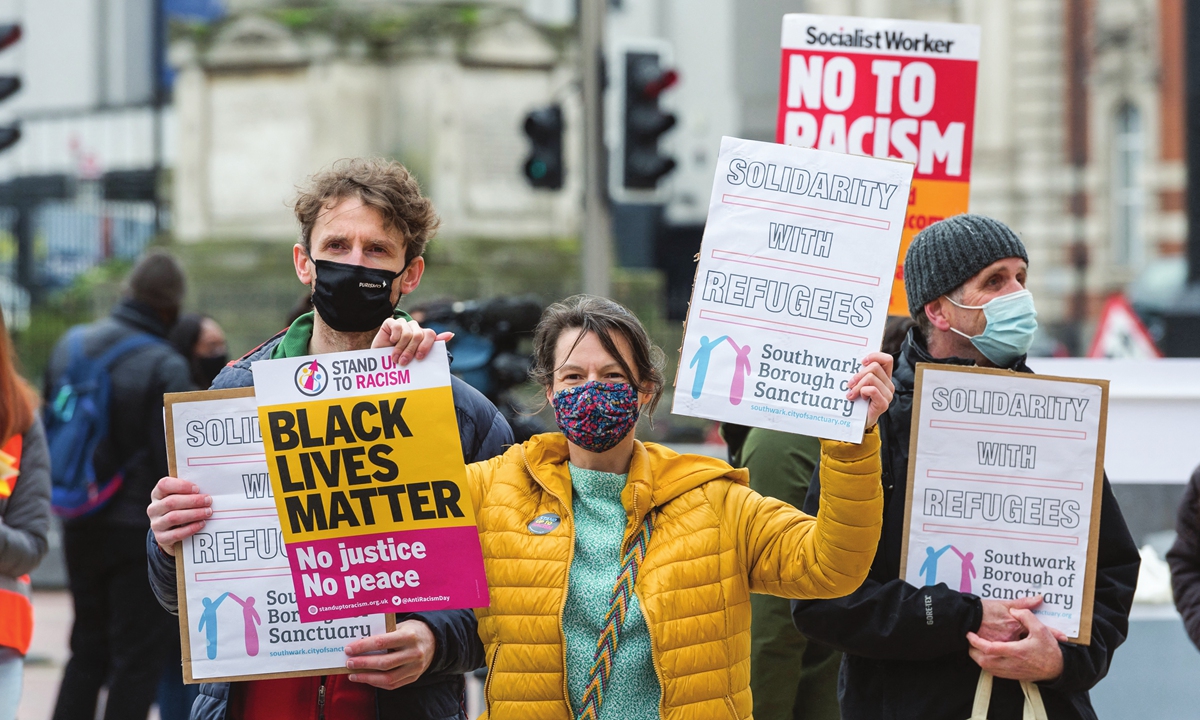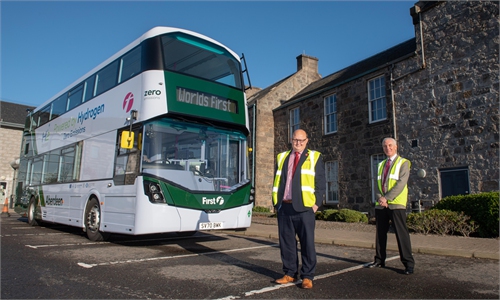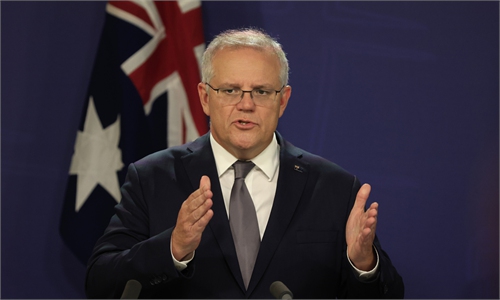
People gather in London to protest against racism to mark the United Nations Anti-Racism Day on March 20 in the UK. Photo:AFP
As a black teenager growing up in South London, Kofi Siaw had a problem - he dreamed of a high-flying career as a city professional, but had no contacts and few role models to help him get there.
Frustrated by seeing young black men depicted in the media mainly in relation to crime, Siaw wanted to show youngsters like him they could aspire to break into white-dominated fields - and reach the top jobs, too.
Working with the Urban Synergy youth mentoring program, he helped organize a series of events featuring black professionals. Even for him, the meetings were a revelation. "I remember at the time being surprised to see a black pilot. I was like, brah, there's black people that fly planes?" said, Siaw, who is now 29 and works as a senior associate at auditing firm EY.
"That was when it just got me thinking 'I've got to think beyond Deptford,'" he said, referring to the inner city district where he grew up.
Black people make up about 3 percent of the population of England and Wales, but hold just 1.5 percent of senior management jobs in the private sector, according to an analysis released in 2020 by Business in the Community, a charity.
No black people held a top three positions at a company listed on the FTSE 100 share index in 2020, found a report by recruitment firm Green Park.
"You've got many barriers to overcome," said Warren Wellington, co-founder and chair of the lack British City Group for professionals working in the City of London.
Those who manage to break into prestigious white-dominated sectors can find their progress checked by a lack of representation and mentorship, as well as often subtle but persistent negative stereotypes about race, he said.
"If racism robs you of opportunity or a chance to better yourself, then to me that's when it really is an issue," he added.
Mentorships
With scant signs of increasing black representation in British boardrooms, mentoring and internship programs offer practical steps to help black youth and entrepreneurs develop their skills and find opportunities.
Among the most ambitious is the 10,000 black Interns, which launched in 2020 with an initial commitment to place 100 young people and quickly grew to encompass more than 700 companies in 24 business sectors.
Out of the more than 500 interns placed so far, about 30 percent were offered either a job or an extended internship, said co-founder Dawid Konotey-Ahulu.
"All of the founders have found our WhatsApp or LinkedIn are literally blowing up every day with people just saying 'this is incredible and has changed the game for me,'" he added.
Many of those launching such initiatives said they had been driven to act by their own struggles to build a career path.
"As a young black man myself, I remember when I was their age, and I didn't have a mentor," said David Wurie of Bright Exchange, a not-for-profit mentorship and intern program working with 15- to 19-year olds.
"I wanted to give back based on what I missed out on."
A lack of senior black staff in many top firms means they are often perceived as "unapproachable" and not for them by black youths, he said, while the companies themselves are generally unaware they have this image.
Mentoring organizations said that despite corporations pledging to improve diversity, they should be doing more to actively reach out to minority and under represented groups.
However, a growing focus from investors on environmental, social and corporate governance (ESG) programs is helping to provide vital funding, said Akil Benjamin, who runs the Mentor Black Business program for entrepreneurs of all ages.
"I know that I fulfill and satisfy a large part of multinational 'organizations' ESG pledges," he said.
'Unequal playing field'
While mentoring initiatives are aiming to help individuals get a foot in the door, some activists are pushing for more transparency over pay and progression.
"If there was an equal playing field, there'd be a lot more black, Asian and ethnic minorities at the top, because we are equally intelligent as white people," said Dianne Greyson, founder of the Ethnicity Pay Gap Campaign.
A report prepared by Center for Social Justice, an independent, center-right think tank in the UK indicates that substantial portions of ethnic minority groups feel their race is a direct hindrance to career advancement, with 29 percent of black Caribbean employees and 35 percent of Pakistani men feeling they were denied promotions because of their race. Also, certain ethnic minority female groups show reluctance to join the job market.
The campaign tracks companies that voluntarily share their ethnicity pay gap, and is also calling for the government to compel firms to share the data.
"It's more than just a financial issue; it's a human rights issue. Everybody should be treated fairly," said Greyson.
Reuters



